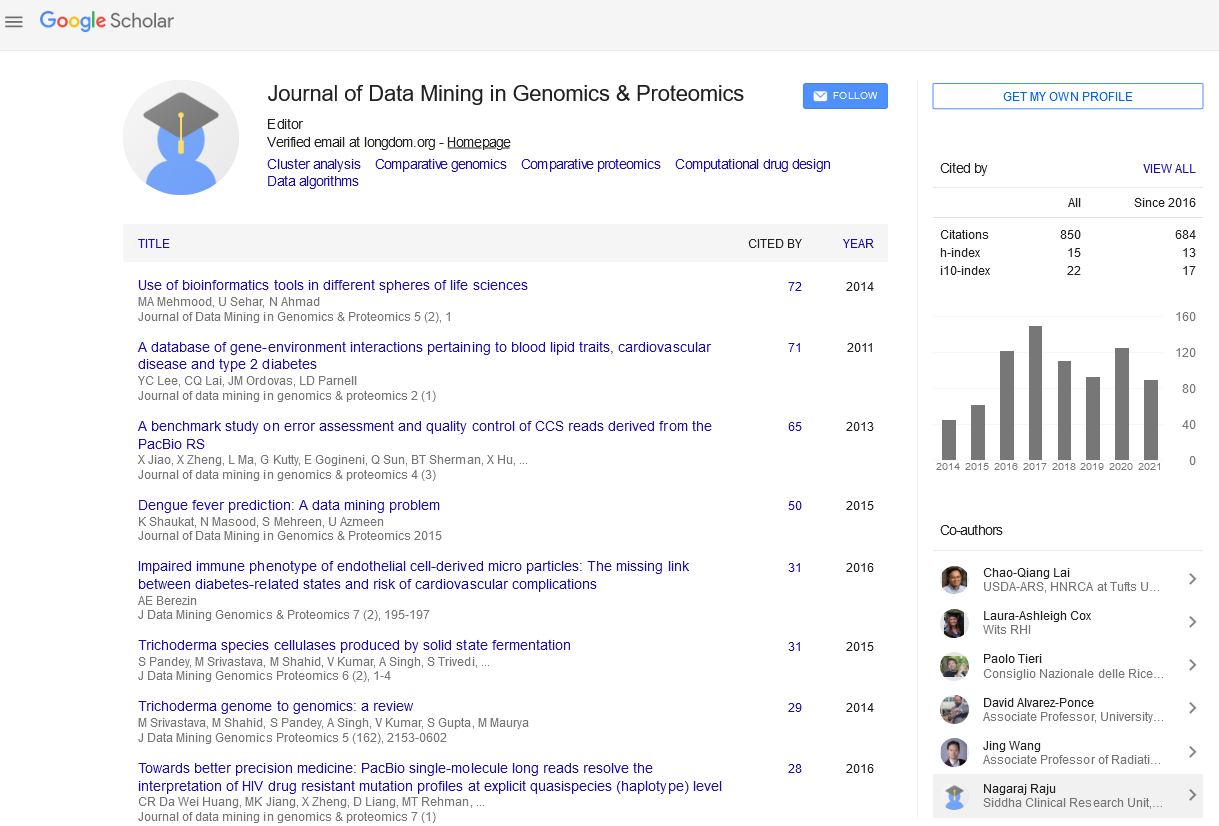PMC/PubMed Indexed Articles
Indexed In
- Academic Journals Database
- Open J Gate
- Genamics JournalSeek
- JournalTOCs
- ResearchBible
- Ulrich's Periodicals Directory
- Electronic Journals Library
- RefSeek
- Hamdard University
- EBSCO A-Z
- OCLC- WorldCat
- Scholarsteer
- SWB online catalog
- Virtual Library of Biology (vifabio)
- Publons
- MIAR
- Geneva Foundation for Medical Education and Research
- Euro Pub
- Google Scholar
Useful Links
Share This Page
Journal Flyer

Open Access Journals
- Agri and Aquaculture
- Biochemistry
- Bioinformatics & Systems Biology
- Business & Management
- Chemistry
- Clinical Sciences
- Engineering
- Food & Nutrition
- General Science
- Genetics & Molecular Biology
- Immunology & Microbiology
- Medical Sciences
- Neuroscience & Psychology
- Nursing & Health Care
- Pharmaceutical Sciences
The metabolic phenotype guiding the discovery of treatable intellectual disability genes
2nd International Conference on Big Data Analysis and Data Mining
November 30-December 01, 2015 San Antonio, USA
Clara Van Karnebeek, Salvarinova R, Shyr C, Sinclair G, Waheed A, Sly W, Wasserman W and Stockler S
University of British Columbia, Canada
Posters-Accepted Abstracts: J Data Mining Genomics Proteomics
Abstract:
Introduction: Intellectual disability (ID) is a lifelong, debilitating condition affecting 2.5% of children and adults worldwide. Our TIDEX project aimed to identify novel, potentially treatable ID genes employing the utility of the metabolic phenotype. Methods: Criteria were applied to select patients for NGS: patient with unexplained, Mendelian ID plus metabolic abnormalities. Whole exome sequencing was performed for trio�??s with customized bio-informatics and subsequent validation. Results: In 8 families meeting the selection criteria, we discovered 6 novel human genetic defects including a new treatable disorder mitochondrial carbonic anhydrase VA (CA-VA) deficiency identified in two non-consanguineous siblings with neonatal lethargy, hyperammonemia, hyperlactatemia and hypoglycemia. CA-VA deficiency impairs bicarbonate provision to four mitochondrial enzymes with a central role in the urea cycle and intermediary metabolism. CA-VA deficiency is amenable to preventive and emergency treatment, and expands the number of treatable IDs. The other discovered genes (various phase validation) include a nuclear mitochondrial disease, biotin responsive, neuronal arborization, early endosomal recycling genes. Conclusions: Our high success rate emphasizes the importance of the metabolic phenotype for gene discovery using NGS technologies. Advantages include: facilitation candidate gene hypothesis, validation causality identified variants, and targets for treatment. Most important, such discoveries can be directly translated into improved patient care.
Biography :
Clara Van Karnebeek obtained her Ph.D. in the genetics of intellectual disability simultaneously to finishing medical school at the University of Amsterdam in the Netherlands. To gain clinical experience and follow her passion for Africa, she then went on to work for a year in remote areas of Malawi and Tanzania for the Flying Medical Services, between 2003-2009 she got trained as a resident in pediatrics in the Academic Medical Centre in The Hague and Amsterdam. She then moved with her husband and two sons to continue her training as a fellow at BC Children’s Hospital in Vancouver, B.C. Since the end of 2011 she has been working as a certified biochemical geneticist in the Division of Biochemical Diseases and divides her time between clinical work and research for Tide-BC. With Sylvia Stockler, she established the Tide program and is responsible for implementation of the evidence-based protocol to screen for treatable intellectual disabilities in the hospital and beyond, as well as for development and trials of novel treatments for neuro-metabolic diseases, such as Pyridoxine Dependent Epilepsy. Her special interest is in evidence-based medicine and knowledge translation resulting in the www.treatable-id.org App as well as implementation of next generation sequencing technologies to identifying novel genes and diseases. She has obtained several grants and awards, and published articles and guidelines on intellectual disability. She works closely together a multidisciplinary team aiming to expand Tide-BC to Tide-Global, setting up new (international) collaborations to improve the outcomes of children with developmental challenges.


